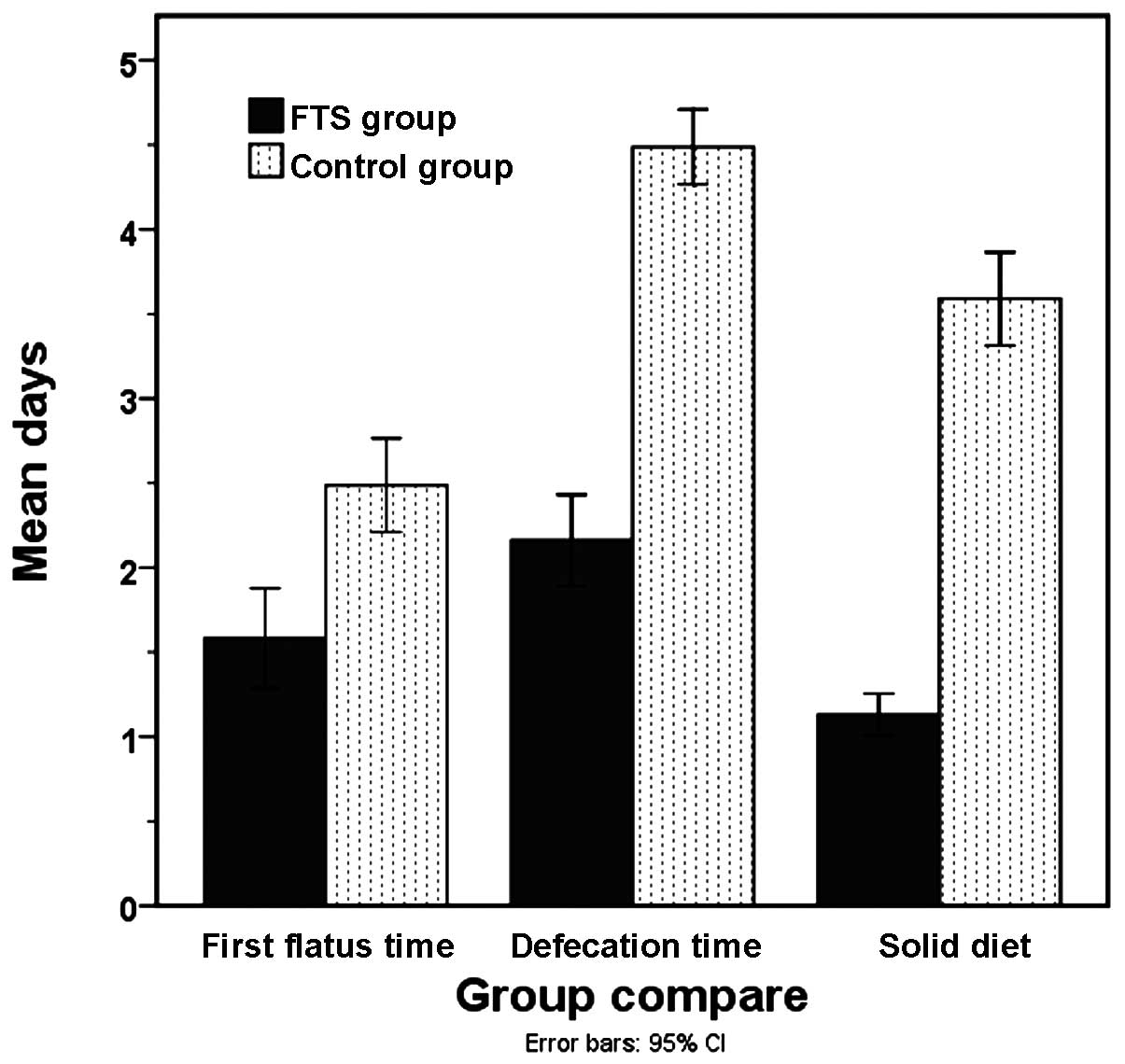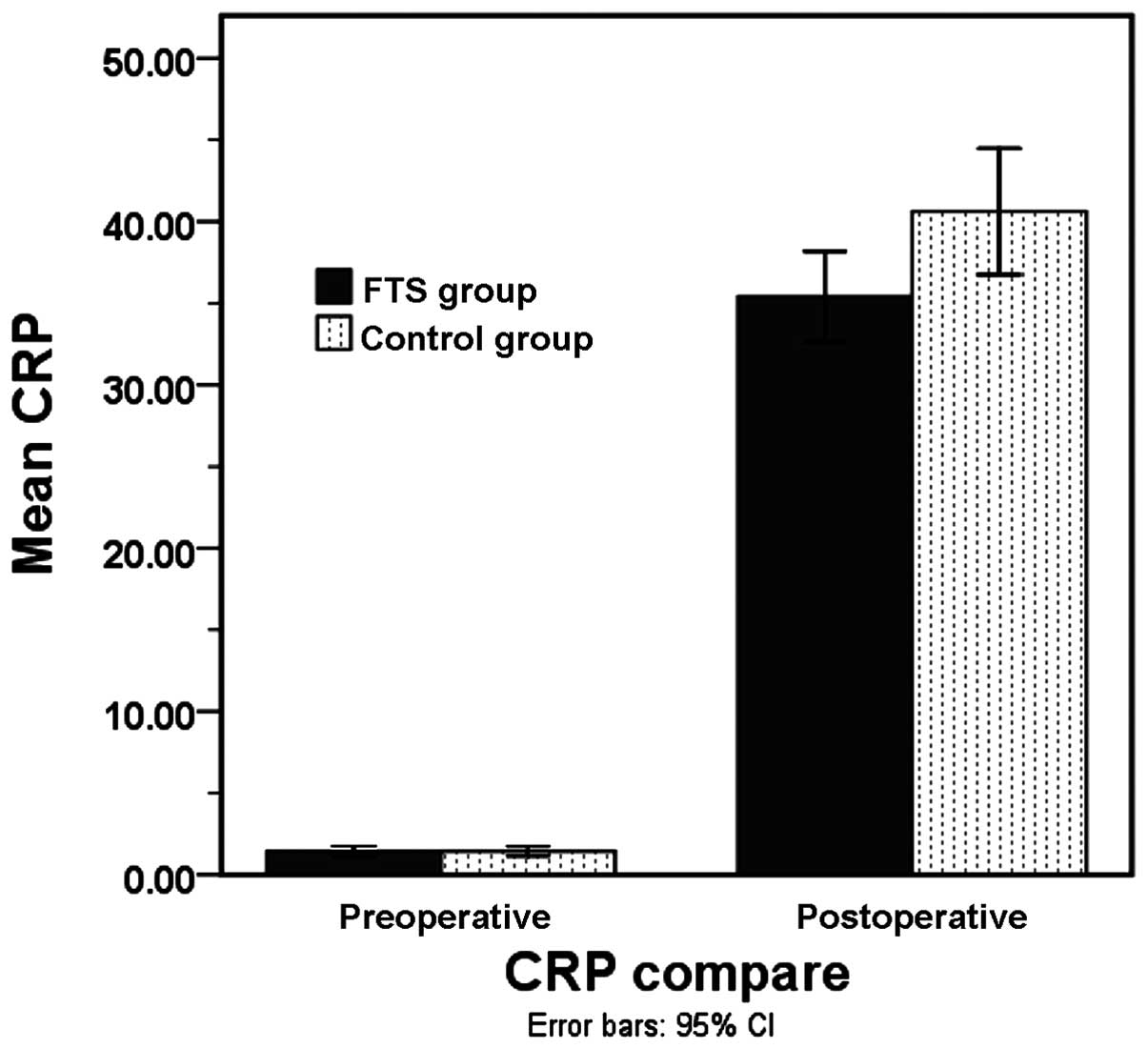|
1
|
Kehlet H: Fast-track colorectal surgery.
Lancet. 371:791–793. 2008. View Article : Google Scholar : PubMed/NCBI
|
|
2
|
Holte K and Kehlet H: Epidural anaesthesia
and analgesia - effects on surgical stress responses and
implications for postoperative nutirion. Clin Nutr. 21:199–206.
2002. View Article : Google Scholar : PubMed/NCBI
|
|
3
|
Raue W, Haase O, Junghans T, et al:
‘Fast-track’ multimodal rehabilitation program improves outcome
after laparoscopic sigmoidectomy: A controlled prospective
evaluation. Surg Endosc. 18:1463–1468. 2004. View Article : Google Scholar : PubMed/NCBI
|
|
4
|
Scatizzi M, Kröning KC, Boddi V, et al:
Fast-track surgery after laparoscopic colorectal surgery: Is it
feasible in a general surgery unit? Surgery. 147:219–226. 2010.
View Article : Google Scholar : PubMed/NCBI
|
|
5
|
Wang G, Jiang ZW, Xu J, Gong JF, Bao Y,
Xie LF and Li JS: Fast-track rehabilitation program vs conventional
care after colorectal resection: A randomized clinical trial. World
J Gastroenterol. 17:671–676. 2011. View Article : Google Scholar : PubMed/NCBI
|
|
6
|
Wang Q, Suo J, Jiang J, Wang C, Zhao YQ
and Cao X: Effectiveness of fast-track rehabilitation vs
conventional care in laparoscopic colorectal resection for elderly
patients: A randomized trial. Colorectal Dis. 14:1009–1013. 2012.
View Article : Google Scholar : PubMed/NCBI
|
|
7
|
Edge S, Byrd DR, Compton CC, et al: AJCC
Cancer Staging Manual. 7th. Springer; New York, NY: 2010
|
|
8
|
Kelley SR, Wolff BG, Lovely JK and Larson
DW: Fast-track pathway for minimally invasive colorectal surgery
with and without alvimopan (Entereg)™: Which is more
cost-effective? Am Surg. 79:630–633. 2013.PubMed/NCBI
|
|
9
|
Baek SJ, Kim SH, Kim SY, Shin JW, Kwak JM
and Kim J: The safety of a ‘fast-track’ program after laparoscopic
colorectal surgery is comparable in older patients as in younger
patients. Surg Endosc. 27:1225–1232. 2013. View Article : Google Scholar : PubMed/NCBI
|
|
10
|
Sommer T, Larsen JF and Raundahl U:
Eliminating learning curve-related morbidity in fast track
laparoscopic Roux-en-Y gastric bypass. J Laparoendosc Adv Surg Tech
A. 21:307–312. 2011. View Article : Google Scholar : PubMed/NCBI
|
|
11
|
British Medical Association Health Policy
and Economic Research Unit, . Work related stress among senior
doctors - review of research. London: BMA; 2000
|
|
12
|
Pineda CE, Shelton AA, Hernandez-Boussard
T, Morton JM and Welton ML: Mechanical bowel preparation in
intestinal surgery: a meta-analysis and review of the literature. J
Gastrointest Surg. 12:2037–2044. 2008. View Article : Google Scholar : PubMed/NCBI
|
|
13
|
Bucher P, Gervaz P, Soravia C, Mermillod
B, Erne M and Morel P: Randomized clinical trial of mechanical
bowel preparation versus no preparation before elective left-sided
colorectal surgery. Br J Surg. 92:409–414. 2005. View Article : Google Scholar : PubMed/NCBI
|
|
14
|
Nygren J, Thorell A and Ljungqvist O:
Preoperative oral carbohydrate nutrition: An update. Curr Opin Clin
Nutr Metab Care. 4:255–259. 2001. View Article : Google Scholar : PubMed/NCBI
|
|
15
|
Ljungqvist O, Nygren J and Thorell A:
Modulation of post-operative insulin resistance by pre-operative
carbohydrate loading. In: Proc Nutr Soc. 61. pp. 329–336. 2002;
View Article : Google Scholar : PubMed/NCBI
|
|
16
|
Brady M, Kinn S and Stuart P: Preoperative
fasting for adults to prevent perioperative complications. Cochrane
Database Syst Rev. CD0044232003.PubMed/NCBI
|
|
17
|
Mathur S, Plank LD, McCall JL, Shapkov P,
McIlroy K, Gillanders LK, Merrie AE, Torrie JJ, Pugh F, Koea JB,
Bissett IP and Parry BR: Randomized controlled trial of
preoperative oral carbohydrate treatment in major abdominal
surgery. Br J Surg. 97:485–494. 2010. View
Article : Google Scholar : PubMed/NCBI
|
|
18
|
Andersen HK, Lewis SJ and Thomas S: Early
enteral nutrition within 24 h of colorectal surgery versus later
commencement of feeding for postoperative complications. Cochrane
Database Syst Rev. CD0040802006.PubMed/NCBI
|
|
19
|
Morończyk DA and Krasnodębski IW:
Implementation of the fast track surgery in patients undergoing the
colonic resection: Own experience. Pol Przegl Chir. 83:482–487.
2011.PubMed/NCBI
|
|
20
|
Gouvas N, Gogos-Pappas G, Tsimogiannis K,
Tsimoyiannis E, Dervenis C and Xynos E: Implementation of
fast-track protocols in open and laparoscopic sphincter-preserving
rectal cancer surgery: A multicenter, comparative, prospective,
non-randomized study. Dig Surg. 29:301–309. 2012. View Article : Google Scholar : PubMed/NCBI
|
|
21
|
Gouvas N, Tan E, Windsor A, Xynos E and
Tekkis PP: Fast-track vs standard care in colorectal surgery: a
meta-analysis update. Int J Colorectal Dis. 24:1119–1131. 2009.
View Article : Google Scholar : PubMed/NCBI
|
|
22
|
Wind J, Polle SW, Fung Kon, Jin PH, Dejong
CH, von Meyenfeldt MF, Ubbink DT, Gouma DJ and Bemelman WA:
Laparoscopy and/or Fast Track Multimodal Management Versus Standard
Care (LAFA) Study Group; Enhanced Recovery After Surgery (ERAS)
Group: Systematic review of enhanced recovery programmes in colonic
surgery. Br J Surg. 93:800–809. 2006. View
Article : Google Scholar : PubMed/NCBI
|
|
23
|
Gatt M, Khan S and MacFie J: In response
to: Varadhan KK Neal KR Dejong CH Fearon KC Ljungqvist O Lobo DN
The enhanced recovery after surgery (ERAS) pathway for patients
undergoing major elective open colorectal surgery: a meta-analysis
of randomized controlled trials. Clin Nutr. 29:2010.434–440
Clin Nutr. 29:689–692. 2010. View Article : Google Scholar : PubMed/NCBI
|
|
24
|
Feroci F, Lenzi E, Baraghini M, Garzi A,
Vannucchi A, Cantafio S and Scatizzi M: Fast-track surgery in real
life: how patient factors influence outcomes and compliance with an
enhanced recovery clinical pathway after colorectal surgery. Surg
Laparosc Endosc Percutan Tech. 23:259–265. 2013. View Article : Google Scholar : PubMed/NCBI
|
|
25
|
Feroci F, Baraghini M, Lenzi E, Garzi A,
Vannucchi A, Cantafio S and Scatizzi M: Laparoscopic surgery
improves postoperative outcomes in high-risk patients with
colorectal cancer. Surg Endosc. 27:1130–1137. 2013. View Article : Google Scholar : PubMed/NCBI
|
















